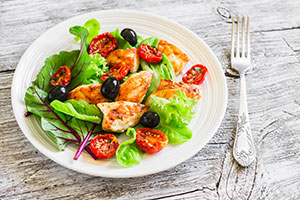Our Health Library information does not replace the advice of a doctor. Please be advised that this information is made available to assist our patients to learn more about their health. Our providers may not see and/or treat all topics found herein.
Topic Contents
Quick Tips: Cutting Calories
Get started

Whole grains, vegetables and fruits, and dried beans are good lower-calorie foods. They give you lots of nutrients and fiber. And they fill you up.
Sweets, energy drinks, and soda pop are high in calories. They give you few nutrients and no fiber. Try to limit soda pop, fruit juice, and energy drinks. Drink water instead.
Some fats can be part of a healthy diet. But cutting back on fats from highly processed foods like fast foods and many snack foods is a good way to lower the calories in your diet. Also, use smaller amounts of fats like butter, margarine, salad dressing, and mayonnaise. Add fresh garlic, lemon, or herbs to your meals to add flavor without adding fat.
Meats and dairy products can be a big source of hidden fats. Try to choose lean or low-fat versions of these products.
Fat-free cookies, candies, chips, and frozen treats can still be high in sugar and calories. Some fat-free foods have more calories than regular ones. Eat fat-free treats in moderation, as you would other foods.
If your favorite foods are high in fat, salt, sugar, or calories, limit how often you eat them. Eat smaller servings, or look for healthy substitutes. Fill up on fruits, vegetables, and whole grains.
Eating at home
- Choose lean protein foods like poultry, fish, tofu, beans, and lean cuts of meat.
- Pick high-fiber foods like whole wheat pasta, brown rice, beans, vegetables, and fruits.
- Find ways to cook with less fat, such as broiling, steaming, or grilling.
- Use cooking spray instead of oil. If you use oil, use a monounsaturated oil, such as canola or olive oil.
- Trim fat from meats before you cook them.
- Drain off fat after you brown the meat or while you roast it.
Eating out
- Order foods that are broiled or poached rather than fried or breaded.
- Cut back on the amount of butter or margarine that you use on bread.
- Order sauces, gravies, and salad dressings on the side, and use only a little.
- When you order pasta, choose tomato sauce rather than cream sauce.
- Ask for salsa with your baked potato instead of sour cream, butter, cheese, or bacon.
- Order meals in a small size instead of upgrading to a large.
- Share an entree, or take part of your food home to eat as another meal.
- Share appetizers and desserts.
Related Information
Credits
Current as of: October 7, 2025
Author: Ignite Healthwise, LLC Staff
Clinical Review Board
All Ignite Healthwise, LLC education is reviewed by a team that includes physicians, nurses, advanced practitioners, registered dieticians, and other healthcare professionals.
Current as of: October 7, 2025
Author: Ignite Healthwise, LLC Staff
Clinical Review Board
All Ignite Healthwise, LLC education is reviewed by a team that includes physicians, nurses, advanced practitioners, registered dieticians, and other healthcare professionals.
This information does not replace the advice of a doctor. Ignite Healthwise, LLC disclaims any warranty or liability for your use of this information. Your use of this information means that you agree to the Terms of Use and Privacy Policy. Learn how we develop our content.
To learn more about Ignite Healthwise, LLC, visit webmdignite.com.
© 2024-2025 Ignite Healthwise, LLC.


